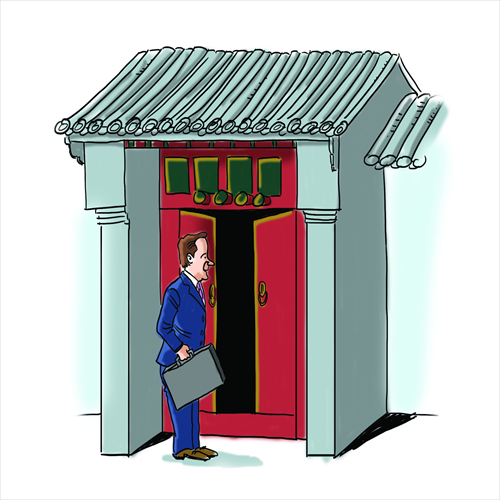Cameron's visit will upgrade bilateral ties

Illustration: Liu Rui/GT
After three long years, UK Prime Minister David Cameron is returning to China. In Cameron's own words, this visit is meant to "forge a relationship that will benefit both our countries and bring real rewards for our peoples."
Business ties between China and the UK have indeed been going strong. Last year, the two countries traded $63.1 billion in goods, resulting in 7.5 percent growth year on year. That growth figure, already impressive in its own right, is dwarfed by a 95 percent jump in Chinese investment in the UK, making the latter the top recipient of Chinese investment across Europe.
We have seen an array of major cooperation outcomes, one after another, from the China Investment Corporation buying a stake of Thames Water to the UK giving the nod to Chinese banks opening branches, and to a Chinese consortium taking part in nuclear power development in the UK.
The British are known to be a practical people. It was not long after WWII that the country adapted to the new reality, and managed to retain considerable international influence by building a special relationship with the US and joining the European Economic Community, which later became the EU.
This practical edge works in the UK's approach to China too. The UK was among the earliest to recognize the momentum of China's growth and its true potential for opportunity instead of challenges.
When last here in 2010, Cameron quoted the lyrics of China's national anthem in his speech at Peking University: "Today the Chinese people are not just standing up in their own country… they are standing up in the world."
According to polls by the Pew Research Center, the British are the most positive people in the West about China, and steadily so, ahead of the French by 5 percentage points, Americans by 10 and Germans by 15.
The UK is also the most open among major Western economies to Chinese investment.
Chinese investors are now moving from labor contracts and real estate into key sectors of telecommunications, nuclear power and utilities. When Chancellor of the Exchequer George Osbourne was recently in China, he visited the headquarters of telecommunications giant Huawei in Shenzhen and the nuclear power plant under construction in Taishan, Guangdong Province. The demonstration of British hospitality to Chinese investment was loud and clear.
The appeal of China to the UK today is rooted in the complementary nature of the two economies.
The UK economy is built on free trade and a strong service sector, especially financial services. After the shock of the financial crisis and the debt crisis, it sees a natural bilateral partner in China, where the massive manufacturing sector is upgrading and outbound investment is picking up speed. There is also potential for the two countries to team up and open up other markets.
The business ties, though robust, are not yet immune to disruptions.
The UK has a strong Western identity, and a definite Western mentality. There are issues where China and the UK don't agree and there are occasions when some in the UK, reminiscent of the imperial past and less-than-sensitive to the feelings of others, cannot hold their thoughts to themselves. This has, to a certain extent, contributed to the lows in China-UK relations in recent years.
China is an opportunity for prosperity, for both itself and its partners. This common sense is crucial, given the prospect of China's continued reform after the Third Plenary Session of the 18th CPC Central Committee.
If the UK is to lead the West in working with China, it needs to develop an approach of genuine respect, equality and mutually beneficial cooperation, an approach that both gives and takes to make the engagement helpful and sustainable.
If the comprehensive strategic partnership between the two countries is truly to live up to its name, it is a must for relations to rise above the bilateral scope and lead the way in the global dimension.
There are certainly significant expectations for Mr Cameron's visit.
The author is a commentator of political affairs based in Beijing. opinion@globaltimes.com.cn